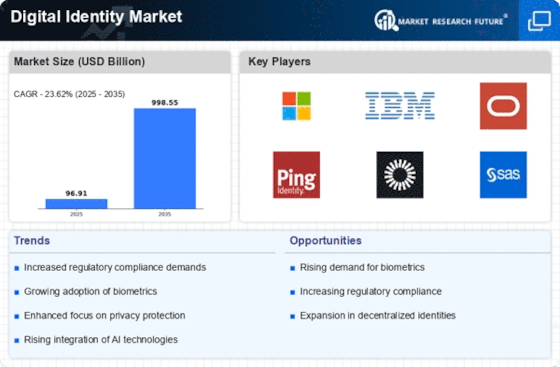Market Share
Digital Identity Market Share Analysis
Digital Identity Market is in the bed of several changes depicting the global tendency towards digitalization with a bias in favor of secure and smooth online communications. Of all the trends defining this market is surely the growing demand for identity verification the use cases which cuts across different industries. With the spread of digital transactions and online services prevalence, the ability to authenticate cornerstone activity for sure has come up. Convenience and efficiency are driving the need for modern identity solutions; Digital Identity market is answering this demand with next-generation identity verification services that utilize biometrics, artificial intelligence, and machine learning to make sure the highest level of security and trustworthiness is met in digital deals.
The other significant tend in Digital Identity industry is becoming the adaption of decentralized identity standards. Ordinary identity systems frequently are based on a central digital distributed processing solution, which may create possible chance of data privacy and security. The responsibility to store the identity information is spread across a particular network in which each node (computer) is responsible for storing parts of data. This gives the individual the power to access and control their personal data. We are witnessing this phenomenon and it is the same way the user’s centrality has been considered in recent identity management systems and security of personal information is now more transparent and safer.
Etholic indicators are becoming the core element of the Digital Identity market trends. Biometrics offers iris scanning, face recognition as well as fingerprint recognition which are secondary to other very reliable and easily accessible technologies. There is a rise of usage of biometrics- based authentication in banking sums, health sectors and also in government services. Implementation of biometrics not only raises the security standards but also increases the usability by taking out the typical username/password authentication methods.
The growth of mobile device and Department of Mobile Identity Solutions is changing the market in Digital Identity. Smartphones are now under the possession of the majority of the world’s population, so that mobile phones have been widely transformed into an inevitable way of identity authentication. Application of mobile identity solutions is based on opportunities provided by the smartphones sensors Data and other features that are focused on identity verification based on users convenience. This movement fits closely to how mobile-first experience becomes more influential in our various online experience.



















Leave a Comment